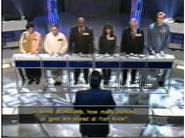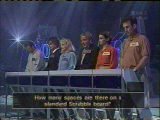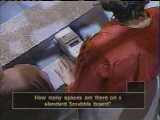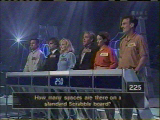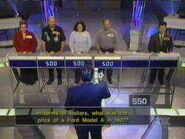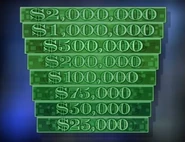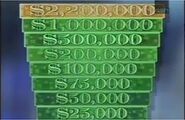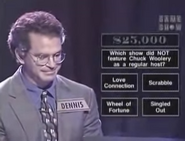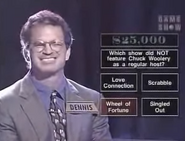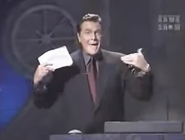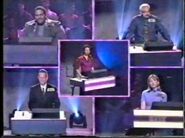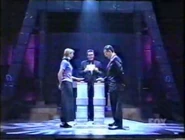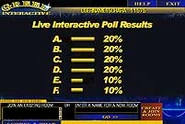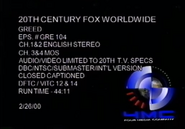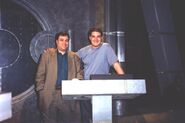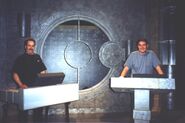| Host | |
| Chuck Woolery | |
| Announcer | |
| Burton Richardson (first episode, edited out in post) Mark Thompson | |
| Broadcast | |
| FOX: 11/4/1999 – 7/14/2000 | |
| Packager | |
| Dick Clark Productions | |
Greed (also known as Greed: The Multi-Million-Dollar Challenge, Greed: The Series, Super Greed, and solely Greed) was a game show similar to Who Wants to Be a Millionaire?, where one team or one contestant could possibly share/win up to $2,000,000 ($4,000,000 on Super Greed). According to Woolery, the show is most often described as "the richest, most dangerous game in America".
Rules of the game
Qualifying round
Six contestants were asked a question with a numerical answer between 10 and 999, and then locked in their answers using a keypad in front of them. Once all players were locked in, the answer was revealed, and the player whose guess was closest to the correct answer became the team captain. The second closest player sat in position #1, the third closest in position #2, the fourth closest in position #3, and the fifth closest in position #4. The player whose guess was furthest away returned to the contestant pool with the possibility of being back for another qualifying round.
If two or more players were tied or of equal distance from the right answer, those players were ranked based on who locked in first. The qualifying round was not played during Greed’s Tournament of Losers episode and was largely eliminated during the five-episode Super Greed era (beginning with the April 28, 2000 episode); as a result, the positions of the show's five contestants were determined via a backstage draw. The qualifying round was also not played during the show's last five episodes.
The team then attempted to answer multiple choice questions of increasing value while climbing the "Tower of Greed." The first question was played for $25,000 and question values increased by that amount up to $100,000 for the fourth question. The fifth question was worth double or $200,000, the sixth worth $500,000, the seventh worth double again $1,000,000 and the eighth worth $2,000,000. As with Millionaire, the amounts were not cumulative.
| Correct Answers | Prize |
|---|---|
| 1 | $25,000 |
| 2 | $50,000 |
| 3 | $75,000 |
| 4 | $100,000 |
| 5 | $200,000 |
| 6 | $500,000 |
| 7 | $1,000,000 |
| 8 | $2,000,000 |
First four questions
Starting with the team member who was furthest away from the correct answer to the qualifying question, multiple choice questions were asked and the team member locked in their answer. The team captain could accept their answer or reject it and select a different answer. The first two questions contained four possible choices and the third and fourth questions contained five possible choices.
Contestants competed for an equal share of the question value. If the team captain accepted a wrong answer for any of the first four questions, the team left with nothing. The team captain could decide to quit with the money won thus far or risk their collective winnings to continue playing the game.
Terminator
After the fourth question the host provided the team with the category for the next question and the opportunity to leave the game with $100,000.
If the captain decided to continue playing, the "Terminator" was activated and selected one team member at random. The player selected could accept $10,000 in cash (that was not at risk should the contestant lose the Terminator or the team missed a future question) in order to challenge another team member to a one-question showdown for their share of the collective winnings.
If the player who buzzed in correctly answered the question, they would claim their opponent's share of the collective team winnings and their teammate was eliminated. If the player provided an incorrect answer or didn't answer within five seconds, they were eliminated and their teammate gained control of their share. However, if the player eliminated was the same player who originally accepted the Terminator challenge, they kept their $10,000.
If the captain was eliminated, the contestant who won the challenge became the new captain. Otherwise, the showdown winner kept his/her original seat.
Originally, contestants were required to wait for the question to be completely read before buzzing in; buzzing in too early immediately eliminated the contestant, just as if a wrong answer had been given. Once Greed became a regular series (beginning with the December 9, 1999 episode) contestants were allowed to buzz in at any time if they knew the answer for the remainder of the show's run, though Chuck would immediately stop reading the question at that point.
The Terminator was played prior to the $200,000, $500,000 and $1,000,000 questions.
Higher-level questions
Beginning with the $200,000 question, each question contained four correct answers. The number of possible answers varied depending on the value of the question: the $200,000 question had six possible answers (four correct answers and two bluff answers), the $500,000 question had seven (four correct and three bluffs), and the $1 million question had eight (four correct and four bluffs aka a 50/50 split).
After the $200,000 question as well as all six of its possible answers were revealed, the captain of the team was given a "Freebie" that he or she could use on any one question from that point onward. The Freebie eliminated one incorrect answer from the question for which it was used. The Freebie could only be used BEFORE contestants began provided their answers as the captain could not use the Freebie once answers had already been provided.
Each of the four team members other than the captain were required to give one answer. If there were fewer than four additional team members the captain could elect to give a response or require a teammate to give an additional response. After all answers had been selected the captain could change any one answer if he or she desired.
The answers were revealed one at a time. After revealing the third correct answer the host offered the captain a cash incentive (one-tenth the value of that question; i.e. $20,000 for the fifth question and $50,000 for the sixth question) to end the game and split equally among the team. If the captain refused the money, the fourth answer was revealed. If it was correct, the team won the money for that round and was allowed to continue.
For the seventh question the buyout changed to an individual decision rather than a decision by the captain on the team's behalf. Each player secretly selected to continue playing or take a 2000 Jaguar XK-8 convertible with every available factory option plus $25,000 in cash in the trunk (approximately $100,000 total value) and leave the game.
As with the fourth question, the category of the next question was revealed prior to the decision to quit or continue playing.
The $2,000,000 question
Prior to the question each team member again individually decided to quit with their share of the team's collective winnings or continue playing.
The $2,000,000 question had nine possible answers, four of which were correct and five of which were incorrect. Only one contestant ever made it to this level, playing by himself (two other contestants had made it past the million dollar question with him but opted to leave with the money they'd already won). Since he was alone, he was given 30 seconds to think about his choices, and then 10 seconds to read them off. If four answers were not given within the time limit, the player would lose everything. No buyout was offered after revealing the third correct answer, and none of the answers could be changed.
Daniel Avila was the only contestant to reach this level, risking $200,000 to go on and play for $2.2 million, but missed the question based on a Yale University study about the four smells most recognizable to the human nose (Peanut butter, coffee, Vicks Vaporub, and chocolate; Avila incorrectly guessed tuna as one of his choices).
Rule changes
For the first six episodes of Greed’s run, during which time the show was titled Greed: The Multi-Million-Dollar Challenge, the top prize was worth $2,000,000 plus an additional $50,000 for each game where the top prize was not won. The jackpot reached $2,550,000 in the first month. When the program became a permanent series, the top prize was a flat $2,000,000.
Special episodes
Million Dollar Moment
In February 2000, eight previous Greed contestants were brought back for a "Million-Dollar Moment", with different "Moments" taking place at the end of different shows. The players were all players who got very close to the big $2 million question, but never made it. Two players faced off with a Terminator-style sudden-death question, and the winner was given a $1 million question. The contestant had 30 seconds to study the question, then 10 seconds to lock in the four right answers to win the money. As usual, missing any part of the question meant that the money was not won; like the $2 million question, there was no buyout after the third correct answer and no answers could be changed.
Curtis Warren became Greed’s only Million Dollar Moment winner when he successfully answered a question about movies based on TV shows and became the biggest U.S. game show winner of all time (as well as the biggest Greed winner) with $1,410,000. His U.S. game show record was beaten within a week as David Legler won $1,765,000 on NBC's Twenty One. Curtis has since been surpassed by others as well (Kevin Olmstead, Ed Toutant, Ken Jennings (twice), and Brad Rutter in that order).
Tournament of Losers
The episode of Greed from February 29, 2000 was a Tournament of Losers episode that consisted of two teams of contestants who were eliminated either via a missed question or due to losing in a terminator match. This episode also featured the show's final Million Dollar Moment in which Dan Avila and Jackie Brakeman faced off in a terminator showdown for a chance at $1 million, which Avila won but later missed the $1 million question on which he had to correctly select the four well-known U.S. cities that had attracted the most oversees tourists in 1999 according to the U.S. Commerse Department. Of the eight possible choices of Chicago, Los Angeles, Orlando, Miami, Las Vegas, New York City, Boston, and New Orleans, Avila made Los Angles, New York City, Las Vegas, and Orlando his selections. Once again, much like his $2 million question on most recognizable smells to the human nose, he correctly answered three out of four but came one short again, whereas he should've picked Miami instead of Las Vegas, which was incorrect, and therefore, went home with nothing again.
TV Greed
In order to promote Fox's TV Guide Awards event which aired on March 5, 2000, Greed’s March 3, 2000 episode consisted of television-related trivia. All 22 contestants who appeared in this episode were those who said to be very knowledgeable in the category of television shows and have passed what Woolery described as a "very tough" test on the subject. This special edition of the show was notoriously known for being the episode in which a contestant was asked a question worth $25,000 regarding Chuck's hosting history. The contestant, despite having proclaimed himself to be a follower of Chuck's career, incorrectly guessed Wheel of Fortune. When their captain accepted it, the answer was revealed to be incorrect, with the correct answer being revealed as Singled Out.
That '70s Greed
The two episodes from March 6 & 7, 2000 consisted of every question with trivia strictly about events, famous/notable people, and/or other facts happening during the decade of the 1970s, including all qualifying, Tower of Greed, and terminator questions. Fox most likely created the That '70s Greed episode as an allusion to Fox's other series That '70s Show. All rules and format of gameplay remained unchanged. However, the first part of this special was a half-hour episode (thus being the only half-hour show of Greed's entire run) with the second edition being a full hour. Former Finders Keepers host Larry Toffler notably captained the final That '70s Greed team that scored a Terminator-free $500,000 win.
Super Greed
Greed became Super Greed for a month in May 2000. The qualifying question was eliminated, and the values for the top three questions were doubled, making the eighth question worth a potential $4 million. This resulted in a $100,000 cash buyout for the sixth question. In addition, any team that went for the seventh or eighth question was guaranteed $200,000 regardless of the outcome of the game. Two teams reached the $2 million question, and one team was able to answer all four parts correctly. If a team reached that question the Jaguar convertible bribe was again offered if three of the four answers were correct, with the car now having $75,000 cash in the trunk (bringing the total value to $150,000). The first team to reach the $2 million question on Super Greed elected to take the bribe for themselves, so the producers instead substituted a $150,000 cash prize for each member of the team that elected to take the bribe (which none did).
| Correct Answers | Prize |
|---|---|
| 1 | $25,000 |
| 2 | $50,000 |
| 3 | $75,000 |
| 4 | $100,000 |
| 5 | $200,000 |
| 6 | $1,000,000 |
| 7 | $2,000,000 |
| 8 | $4,000,000 |
College Rivalry Greed
On May 26, 2000, the week following the airing of Super 'Greed's final episode, FOX aired a College Rivalry Week special, which consisted of four teams of college students coompeting for a possible $2 million. The show was reverted back to its normal format (with the $2 million top prize value, the sixth and seventh questions each worth $500,000 and $1 million respectively, and the return of the qualifying round) each of the four teams of college students were from different divisions of colleges but attended different schools at the time of their appearance on the show. For example, the first group of players were all students from Atlantic Coast Conference Schools (or Team ACC) but all attended different colleges within ACC, the second group were Ivy Leage Students, the third Pac 10, and the final team (which concluded its run at the beginning of the episode from June 2, 2000) were from Big 10 schools. In regular episodes, contestants were introduced by name and the named contestant looked into the camera and told the viewers the city and state they were from as well as their occupation. But on College Rivalry Greed, contestants instead substituted the city and state they were from with the name of the college they were attending and in place of an occupation stated their major, or field they were studying in college. Due to time constraints, the Big 10 team's (Greed’s final college team) gameplay was haulted after their $100,000 win at the end of the hour and was resumed on the June 2, 2000 episode. After their gameplay concluded regular teams followed.
Highest winners of Greed
Original airing dates (as listed at [2]) are included. Note: Teams that earned $500,000 or more were paid through an annuity.
| Player | Money Total | Date + Additional Information |
|---|---|---|
| Curtis Warren | $1,410,000 | November 18, 1999 and February 11, 2000 (combined winnings from both shows)
Before his stint on Greed, Warren was a champion on Sale of the Century in 1986 and also appeared on Win Ben Stein's Money, where he won $700 after failing to beat Ben. Warren's winnings were enough to overtake Twenty One contestant Rahim Oberholtzer (who won $1,120,000) for the highest amount won by any contestant; the record was broken by David Legler (who won $1,765,000) four days after his second episode had aired. |
| Lauren Griswold | $810,000 | May 12, 2000 (Super Greed)
Griswold's winnings were the highest amount of money won by a female contestant at the time; she would be overtaken by Nancy Christy on the May 8, 2003 episode of Millionaire. |
| David Juliano | $800,000 | May 12, 2000 (Super Greed)
Juliano won $8,000 on Jeopardy! in 1993. Like Warren, he was also a contestant on Win Ben Stein's Money having won $900 and then beating Ben for the entire $5,000; and more recently (like Daniel Avila) he was on Millionaire. |
| Monique Jones | $610,000 | May 19, 2000 (Super Greed) |
| George Elias | $600,000 | May 2, 2000 (Super Greed)
Elias later won $100,000 in the Donny Osmond version of Pyramid. |
| Melissa Skirboll | $410,000 | November 18, 1999 |
| Phyllis Harris | $400,000 | May 12, 2000 (Super Greed)
Phyllis Harris was captain of the team that included Lauren Griswold and David Juliano, who are respectively the 2nd and 3rd highest money winners on Greed. She also would later play on Millionaire (much like David). |
| Madeleine Ali | $320,000 | December 10, 1999 |
| Robert Abramoff | $310,000 | November 4, 1999 |
| Annemarie Buchta | $310,000 | February 18, 2000
Buchta appeared on Press Your Luck in 1986, winning $62,708, which is the second-highest total in that show's history. |
| Jeff Ester | $310,000 | February 18, 2000 |
| Evan Benner | $310,000 | June 23, 2000 |
| Jill Schilstra | $310,000 | June 30, 2000 |
| Bob Harris | $200,000 | May 2, 2000 (Super Greed)
Bob Harris was on George Elias's team and previously appeared on Jeopardy!. |
| John Epperson | $230,000 | April 28, 2000 (Super Greed)
Epperson's winnings included $155,000 and a Jaguar XK8 convertible valued at $75,000. |
| Lisa Stigers | $190,000 | April 28, 2000 (Super Greed)
Stigers' winnings included $115,000 and a Jaguar XK8 convertible valued at $75,000. |
| Jeff Gouda | $100,000 | April 28, 2000 (Super Greed) |
International Versions
The countries that did their versions of Greed include:
- Arab World
- Argentina
- Australia
- Brazil
- Denmark
- Finland
- France
- Germany
- Italy
- Mexico
- Poland
- Portugal
- Russia
- South Africa
- Spain
- Sweden
- Turkey
- United Kingdom
- Venezuela
Additional Page
Greed/Video Gallery
Greed/Quotes & Catchphrases
Interactive Version
GSN had their own interactive game on their website where you could play along with the show for a brief period.
Photos
Studio
- Fox Television Center, Hollywood, CA (November to May?)
- CBS Television City (Stage 36), Hollywood, CA (May to July)[1]
Rating
Music
Edgar Struble
References
Links
Rules for Greed @ Loogslair.net
Rules for Greed @ The Game Show Galaxy
Rules for Greed @ The Game Show Temple
Greed Fan Page from StormSeeker.com
GREED Fan Page!
YouTube Videos
Can you lose on the $25,000 question? In a way, yes.
Curtis Warren's Million Dollar Moment
Dan Avila's $2.2 million attempt



